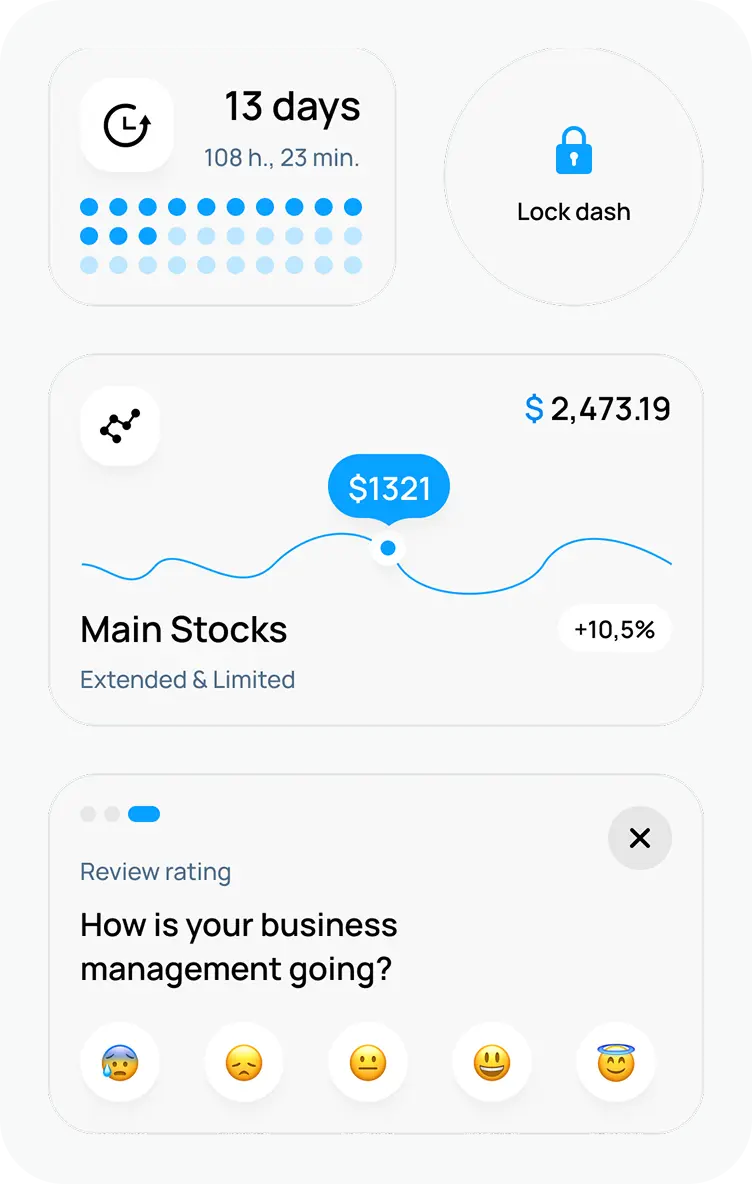Angular to React Migration: Switch Fast & Easy
March 24, 2025•10 min read

I hope you enjoy reading this post. If you want us to do your frontend development or design, click here.
Author: Alex Vasylenko | Founder of The Frontend Company


For many CTOs and CEOs, the decision to migrate from Angular to React is driven by the need for better performance in complex interfaces and greater versatility across industries. React's lightweight component architecture gives more flexibility and a broader ecosystem, making it the top choice for modern applications.
But before you start your migration, you need to understand all the steps, risks, and best strategies to make a smooth transition.
In this article, we will help you understand how to craft a step-by-step migration plan and why this is a strategic business move aligned with market trends, not just a developer preference.
By the end, you will be closer to your goal of making a fast and easy switch that aligns with your business needs.
Let's start by exploring why companies are making the switch.
Angular to React: 5 Reasons to Migrate
If you are thinking about migrating from Angular to React, it is a great idea to deal with. More and more companies see the excellence of ReactJS in every major market and compare it with Angular, whose popularity is declining every year.

Moreover, developers also choose the best options for themselves. They prefer working with tools that avoid routine tasks, give creative freedom, and push them to make the best product possible.
Before we jump to the main reasons for Angular to React migration and explain why sticking with Angular might not be the best move for your business, read our important note about AngularJS.
📝Note: If your site or platform is based on AngularJS, it doesn't really matter whether you migrate to Angular or React — this is far better than staying on AngularJS, as that technology is now dead and no longer supported. In such cases, migrating to Angular might make more sense, as its structure is similar to AngularJS. I've also posted a comprehensive guide about AngularJS to Angular migration, where you will find step-by-step instructions and answers to all your questions, so make sure to check it out.
Now, let's go to the 5 Reasons to Migrate from Angular to React.
Larger Talent Pool and Ecosystem
The first reason to migrate from Angular to React might seem trivial, but it's incredibly impactful. React community and ecosystem are the biggest in the frontend development industry, making hiring talents significantly easier and faster.
In fact, the Angular developer community is smaller than React's by almost 100%, and Google Trends confirms this.

This gap in community size is reflected in the job market: at the time of writing, UpWork lists over 5,600 job offers for React developers.

While Angular struggles to reach even 1,000.

This shift highlights that more businesses are choosing React because it enables the fast creation of dynamic user interfaces and continues gaining ground.
Moreover, React's ecosystem offers a vast selection of third-party libraries and tools at your disposal, so developers can quickly integrate new features without building them from scratch.
Better Performance for Complex Interfaces
The second key reason to convert Angular to React is the superior React performance when you work with complex, feature-rich user interfaces. If I were making a highly interactive system such as Figma or an Image Editor, I would choose React because its dynamic nature makes it an indispensable tool for implementing advanced features like drag-and-drop, control elements, and other intricate UI interactions.
These performance benefits are available due to virtual DOM. It minimizes the number of updates, making rendering faster and more efficient, even in applications with a high level of user interface complexity.
While Angular can also support large-scale applications, its structure is overhead when dealing with dynamic, real-time updates.
Global Operations
Angular to React migration is a crucial process for businesses that are operating multiple offices or preparing to expand globally.
React is the preferred choice around the world, whereas Angular is only prominent in a few South American countries like Peru, Argentina, and Bolivia.

Therefore, if you plan to open offices in the U.S., Germany, or China, transitioning to React will give you access to a larger pool of skilled teammates. Developers in these regions are more experienced with React, making the hiring and onboarding process faster and more efficient.
In contrast, sticking with Angular will lead to longer recruitment times, as the framework is less used in key markets. No one wants to spend much time hiring Angular talents and trailing behind competitors who are already moving ahead and achieving results faster with React.
Seamless Transition to Mobile with React Native
If your business plans to expand into mobile app development, or you need a mobile app to complement your core offerings, you need to think twice about sticking to Angular.
React Native allows developers to reuse much of the same codebase from a web application, significantly speeding up development times and reducing costs. Moreover, this cross-platform compatibility ensures that your app can be built for iOS and Android, cutting down the need for separate development teams.
Angular does not have the same level of seamless integration with mobile development. The transition between web and mobile products is not as smooth, often requiring additional steps and learning curves.
By choosing React and React Native, you can adapt quickly to new business needs, future-proof your business, and minimize duplication of work.
Versatility Across Industries
The last but certainly not less important feature of React is its unmatched versatility, which makes it an ideal choice for a broad range of industries and platforms.
While Angular is like a skyscraper — solid, structured, and well-suited for specific, large-scale applications — React is more like a multi-tool, adaptable and flexible for almost any task.
Whether you're building an e-commerce platform, a media application, or an automotive solution, React's component-based architecture and ease of integration with various tools make it perfect for quickly implementing changes and adding new functionalities.
If your project on Angular is becoming too restrictive or needs to evolve with new technologies, migrating to React will allow your team to move faster and address all challenges with ease.
💡 After learning about the reasons for migrating from Angular to React, you may still have questions about realization. Don't worry. We are here to help. Contact us, and we will provide prospects for your project and recommend the best option for scaling your business for free.
How to plan Angular to React Migration
A good plan for Angular to React migration is key to avoiding losing time and money. Here's what you need to include before a free consultation with Angular development services:
1. Audit Your Existing Angular Application
What to Do:
Conduct a UI/UX design audit of your Angular application. If you struggle to do it, you can book a free 1-hour audit with the TFC Founder. I will help you identify current issues and understand potential future challenges and limitations in UI/UX implementation.
Some libraries used in Angular might not have direct equivalents in React, which means you need alternative solutions.
Determine which parts can be migrated smoothly and which might require a complete rewrite.
Why It Matters:
This audit prevents unexpected issues and helps in defining the migration scope.
2. Define Migration Goals & Priorities
What to Do:
Clarify why you want to migrate and what outcomes are expected (e.g., better performance, maintainability, scalability).
Choose the best features to migrate first. Instead of attempting to move everything at once, businesses should focus on high-impact areas that deliver the most value post-migration.
Decide how to measure success (e.g., improved speed, development efficiency).
Why It Matters:
A clear strategy prevents scope creep and ensures the migration aligns with your needs.
3. Prepare Your Development Team
What to Do:
Partner with the best Angular migration service providers.
Identify with them the key developers responsible for the migration. Developers should be familiar with JSX, React hooks, one-way data binding, and component lifecycles before starting the migration.
Why It Matters:
A great team of developers makes the Angular to React migration fast and prevents unnecessary rewrites.
4. Plan for Risk Management & Testing
What to Do:
Develop a backup plan in case issues arise.
Set up tests to compare Angular vs. React outputs.
Allocate buffer time for debugging and performance optimization.
Why It Matters:
Migrations always come with risks, and a poorly executed transition can introduce bugs, downtime, or performance regressions.
Final Preparation Before Angular to React Migration Begins
Before starting the migration, the following should be in place: a full application audit, clearly defined goals, a chosen migration strategy, a prepared development team, and a risk management plan.
With these foundational elements, the actual migration process can proceed with minimal disruptions and a smooth transition from Angular to React.
📖 Read More: Top 7 U.S. Angular Development Companies in 2025
Choosing the Best Angular to React Migration Strategy
After preparation, it's time to choose the method of Angular to React migration. There are two primary migration strategies: a full rewrite and an incremental migration (Strangler pattern).
You need to know the advantages and disadvantages of both because this choice is very basic during Angular to React migration.
Full Rewrite
A full rewrite means rebuilding your entire application from scratch in React, replacing Angular completely. It is often ideal when the existing Angular application is outdated and inefficient architectures can be eliminated rather than carried over.
Advantages of a full rewrite:
You can redesign the application architecture and improve it for user needs.
This method eliminates any legacy code or technical debt from the old Angular application.
All components follow modern best practices without needing to accommodate old dependencies.
Challenges of a full rewrite:
You need more investment in time and resources.
It has longer development timelines before the new React version is ready for deployment.
The migration to the new system may influence business operations.
Risk of missing features or new bugs during the rewrite.
How a Full Rewrite from Angular to React Happens
The process typically unfolds in several key phases:
1. Analysis & Planning
The first step is using a detailed audit of the Angular application to document key functionalities, dependencies, and business-critical features. At this stage, teams also decide on the React tech stack, including state management (Redux, Context API), routing (React Router, Next.js), and UI frameworks.
2. Setting Up the New React Project
Once planning is complete, the development team initializes a new React codebase, establishing the project structure, coding standards, and architectural decisions before writing the first component.
3. Rebuilding Core Features & Components
Developers start by recreating foundational components such as navigation, layout, authentication, and global state management. They prioritize Business-critical features, ensuring the new React app delivers functional parity with the Angular version.
4. Data Migration & API Integration
Any backend interactions, database connections, or APIs used in the Angular app must be adapted for React. If the Angular app relied on services like HttpClient, these are replaced with React-friendly alternatives such as fetch or Axios.
5. Testing & Validation
Before replacing the existing application, the new React version undergoes unit tests, integration tests, and user acceptance testing. Developers compare performance, usability, and business logic execution against the original Angular application to ensure nothing breaks.
6. Deployment & Cut-Over
Once testing is complete, the old Angular application is fully replaced with the new React version. The deployment is usually done in a staged rollout, starting with a subset of users before a complete switch.

Transform your UI for peak performance!
🔹
Unlock seamless, high-performance frontend solutions tailored to your business.
🔹
Get an interface that outshines competitors and delights your users.
Incremental Migration (Strangler Pattern)
This approach is often the best choice for enterprise applications where a full rewrite would take too long or disrupt critical operations. It is like renovating a house while still living in it — you replace outdated parts one by one rather than tearing everything down at once.
Advantages of incremental migration:
Allows React and Angular to run side by side.
Has continuous delivery so features can still be deployed while migration is in progress.
Lower initial risk, as each phase of migration can be tested before moving to the next.
Provides flexibility to adjust the strategy over time based on growing business needs.
Challenges of incremental migration:
Requires managing two frameworks in parallel, increasing temporary complexity.
Some features may require workarounds to maintain compatibility between Angular and React components.
Larger applications may take longer to fully migrate, especially if interdependencies between Angular and React components are complex.
How an Incremental Migration From Angular to React Happens
The process unfolds in several key stages:
1. Choosing Where to Start
The first step is figuring out what to migrate first. You don't just rip out the foundation — you start with low-risk, high-impact features. UI components like buttons, modals, and navigation bars are great starting points since they're self-contained and don't interfere with business logic.
2. Letting Angular and React Work Together
Here, the development team integrates React into the existing Angular application, ensuring that both frameworks communicate smoothly. Think of it as upgrading your car's engine while still keeping the old frame.
3. Replacing Features One by One
At this stage, the migration begins one feature at a time. A component is rewritten in React, tested, and swapped in. Over time, React slowly takes over, and Angular's presence in the application shrinks. The goal is to make the transition feel invisible to users — the app keeps running, but under the hood, things are getting an upgrade.
4. Saying Goodbye to Angular
At this stage, any remaining dependencies are removed, and the codebase is fully optimized for React. The migration is officially complete without ever having to pause development or disrupt users.
Ready to Migrate from Angular to React, But Don’t Know Where to Start?
Yes, I want a step-by-step plan tailored to my business and product
How to Migrate from Angular to React
Angular to React migration isn't something you can manage alone or with a small internal team that's already handling day-to-day development.
To make a successful migration, you need to partner with experienced professionals who have done this before. A skilled team will assess your current system, recommend the best migration strategy, and handle everything from architecture planning to implementation, testing, and deployment.
At The Frontend Company, we've successfully completed 100+ Angular to React migrations, including both full rewrites and incremental transitions. Contact us as we understand what works, what doesn't, and how to help you switch fast, safely, and with minimal disruption to your business.
💡 Instead of taking unnecessary risks, partner with an Angular migration agency that can handle the migration efficiently.
Angular to React Migration Challenges & How to Overcome Them
The list of Angular to React migration challenges includes:
1. Cost Management
The first challenge you face is hidden costs and budget management. A complete rewrite is an investment that can reach up to a million dollars, depending on the complexity of your application.
Even if your Angular to React migration starts at $50,000, you must control your budget in the best possible way.
Moreover, you need to avoid hidden costs that the company is trying to push to budget. It can be things like re-testing the entire application or implementation of another unnecessary state management library.
Solutions and Best Practices:
Manage resources: Before embarking, ensure you have the people, time, and money available for the entire migration. If resources are tight, you may need to find alternatives, like migrating only critical parts first.
Avoid hidden costs: Clearly outline what is included in the migration and what is not. Specify which parts of the app need refactoring, testing, and infrastructure changes so nothing unexpected gets added later.
Break down costs and request transparency: Ask for a detailed cost breakdown from the development team, including testing, deployment, and post-migration support.
2. Business Continuity
The next challenge is making the Angular to React migration and keeping your business on track. When a development team manages two frameworks at the same time, it can introduce inconsistencies, slow down development, and make bug fixes more complex. To keep both systems running smoothly, you need a clear transition plan.
Solutions and Best Practices:
Use phased migration: Instead of switching everything at once, replace Angular components one by one and ensure that critical features are working throughout the migration.
Implement parallel testing: Run Angular and React versions side by side, testing for inconsistencies to catch bugs before full deployment. This ensures a smooth handover without unexpected downtime.
Collect feedback: Gather user feedback during migration to detect potential problems early, reducing risks to customer experience and business operations.
3. Delays That Impact Your Business
A migration that goes on too long can slow down new feature releases and frustrate customers. The longer the migration takes, the greater the risk of losing market momentum and falling behind competitors.
Without a clear timeline and efficient plan, you can face increased costs, lost revenue, and be stuck between two systems.
Solutions and Best Practices:
Set a strict migration timeline with checkpoints: Work with a team that delivers clear phases and milestones to keep the project moving without disruption.
Choose a migration partner that guarantees efficiency: A professional team keeps your project on schedule and doesn't waste months on unnecessary rework.
📖 Read More: 5 Best Angular Migration Service Providers in 2025
Conclusion:
Switching from Angular to React could be a stressful experience. But it gives you faster development and superior performance that your clients need today. If you feel worried about challenges that you may face during migration, partner with the professional migration team.
At The Frontend Company, we specialize in fast Angular to React migration with minimal disruptions and delays. It doesn't matter whether you need a full rewrite or a phased migration; our development team will make a cost-effective, well-executed conversion to React that keeps your business running smoothly.

Unlock the full potential of your product

Boost customer retention & satisfaction

Become more competitive on the market

Move to the latest technologies stacks

Improve usability & visual appeal
FAQ

Alex Vasylenko is the founder of The Frontend Company, DBC and several other successful startups. A dynamic tech entrepreneur, he began his career as a frontend developer at Deloitte and Scandinavia's largest banking company. In 2023, Alex was honored as one of 'Top 10 Emerging Entrepreneurs' by USA Today.
RATE
Rate this article please
This will help us provide more useful information.
1565 ratings, average 4.88 out of 5
